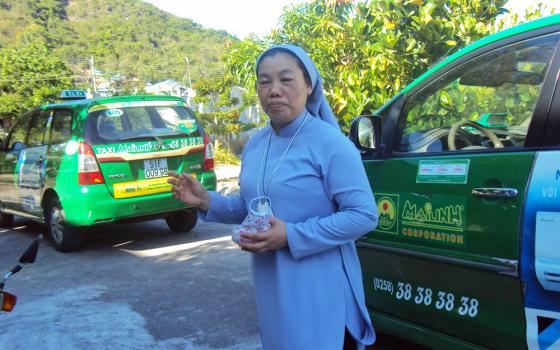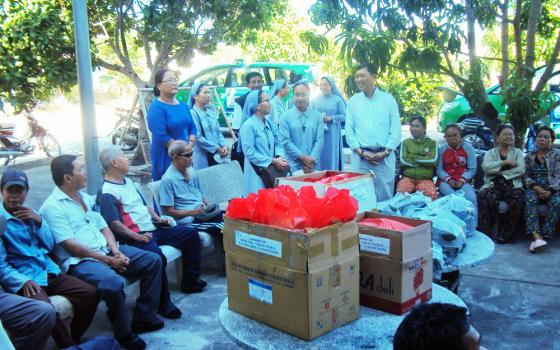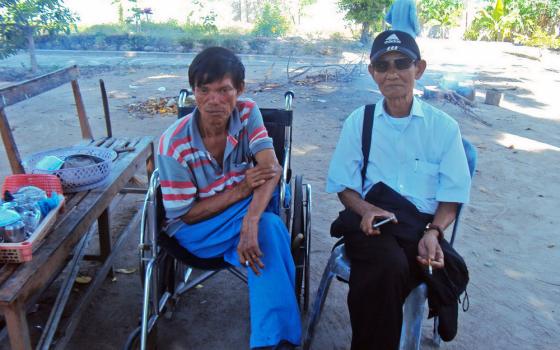The Venero-Dermatology Hospital based in Khanh Hoa Province, south-central Vietnam, provides prevention, diagnosis and treatment of skin disorders, especially leprosy.
The state-run hospital, established in 1982, cured hundreds of patients of the disease from the province and other places in 1990s and 2000s, helping dramatically reduce the number of patients. Now some 40 patients are treated at the hospital yearly.
The facility is the former Anti-Hansen Center, founded in 1963 by Franciscan priests. After the Vietnam War ended in 1975, the communist government confiscated the center and forced Franciscans to leave. Only Franciscan Missionaries of Mary nuns were allowed to work with patients at the hospital for decades.
Now, hospital officials allow only two nuns to serve patients as volunteers at the hospital. One of them is Franciscan Missionaries of Mary Sr. Anna Ngo Thi Phuc, who offers free medical treatment to patients. The other is from the Daughters of Charity of St. Vincent de Paul who gives free meals to them.
The prevalence of the disease has dropped to less than 1 case per 10,000 people since 1995, but the number of new cases detected every year in Vietnam is still high, according to the Vietnam General Department of Preventive Medicine. Patients get access to free treatment with multi-drug therapy at healing centers or at home.
However, many leprosy patients are abandoned by their relatives and live in poverty. They mainly live on material and emotional supports from the nuns and benefactors.
Phuc recently spoke to GSR about her ministry to leprosy patients.
GSR: Please tell me about your ministry.
Phuc: The hospital now provides free medical treatment for 37 inpatients. They are also given a monthly allowance of 360,000 dong [$15.40]. They cannot live on the allowances because they have to pay the hospital 50,000 dong for their daily food alone.
One sister from the Daughters of Charity of St. Vincent de Paul daily prepares meals at her convent and offers them without charge to inpatients as way to help them save money for other needs.
I visit patients daily, take care of their wounds, offer medicine to cure them of other illnesses, remind them to take medicine on time, console them, listen to their feelings and try to meet their needs as much as I can.
I bring the Eucharist to patients at the hospital every week. Patients confess and receive the last rites from local priests.
I also hold catechism classes, conduct a choir and do other pastoral activities at the nearby Nui San Church, which serves former lepers and local people.
We invite Catholic benefactors from other places to offer food, clothes, blankets and other basic supplies to them on Catholic feasts and national festivals.
We offer scholarships to 20 students whose parents are lepers so that they pursue further studies and have a brighter future.
How are patients taken to the hospital?
We find lepers when we visit and offer health care, basic education and food to poor people in parishes and villages in remote areas. Priests and religious from other places introduce patients to us. We encourage and offer them money to travel to the hospital.
Patients are reluctant to receive hospital treatment, which they fear will cost them a lot. They do not know they are treated without charge.
What difficulties do patients face?
Their families no longer visit them after they are sent to the hospital. Partly they live in poverty and fear being infected with the contagious disease.
For example, Tran Thi Hong has been left by her husband since she was diagnosed with leprosy 30 years ago. Her fingers and toes became deformed. She is 50 and lived alone in a shelter near a cemetery and was regularly hospitalized because of her recurring illness. Now, we look after her in the hospital.
Another patient, James Tong Chi Hiep was abandoned by his family when he got the disease at the age of 10. He is now 43 and has to use a wheelchair to move around. In the past, he failed to commit suicide — Franciscans saved him. Now he absolutely trusts in God and is grateful to church workers.
Most patients are old, suffer severe leprosy and cry out in agonizing pain, but they have no relatives to look after them. I cannot stay with them at night at the hospital because I have to do other work at my convent and the church.
In addition, staff workers examine patients in normal office hours, and some elderly patients fall asleep and miss the treatment. We patiently wait until they wake up and clean their wounds.
In our experience, lepers really thirst for love and care from us to overcome physical pain and cure them of psychological wounds.
We are happy that patients, including non-Catholics, daily pray in front of a Marian grotto built by Franciscans in the hospital compound.
What is your joy?
Patients have great respect for us. Many are moved to tears as they leave the hospital for home after treatment. They warmly receive us when we visit their homes. They show academic achievements of their children, who receive scholarships from us. They always express their deep sense of gratitude to us for what we have done for them.
Doctors and nurses in the leprosy ward respect me and appreciate my work. They offer me flowers and gifts on Christmas and Tet festival [Lunar New Year]. They also warmly receive Catholic benefactors who visit patients after receiving my introduction.
We are happy that hundreds of patients have enjoyed better health care and live a life of dignity thanks to active cooperation between the staff and the local church for years.
We see an image of crucified Christ in our patients who are wracked with pain and publicly disgraced. We can strengthen our faith by means of serving them. We try our best to look after them like Jesus and love them as we love our relatives.
We also train our novices to have the spirit of serving marginalized people by sending them to a state-run center for elderly people with relatives and mentally ill patients near our convent. They cut their nails and hair, bathe them, clean their beds, feed them and talk with them on Sundays.


